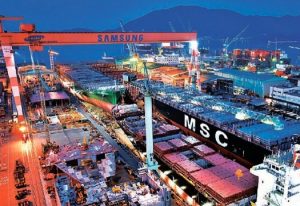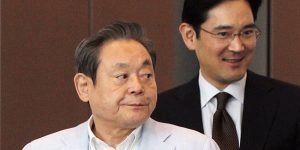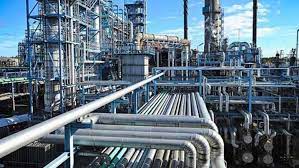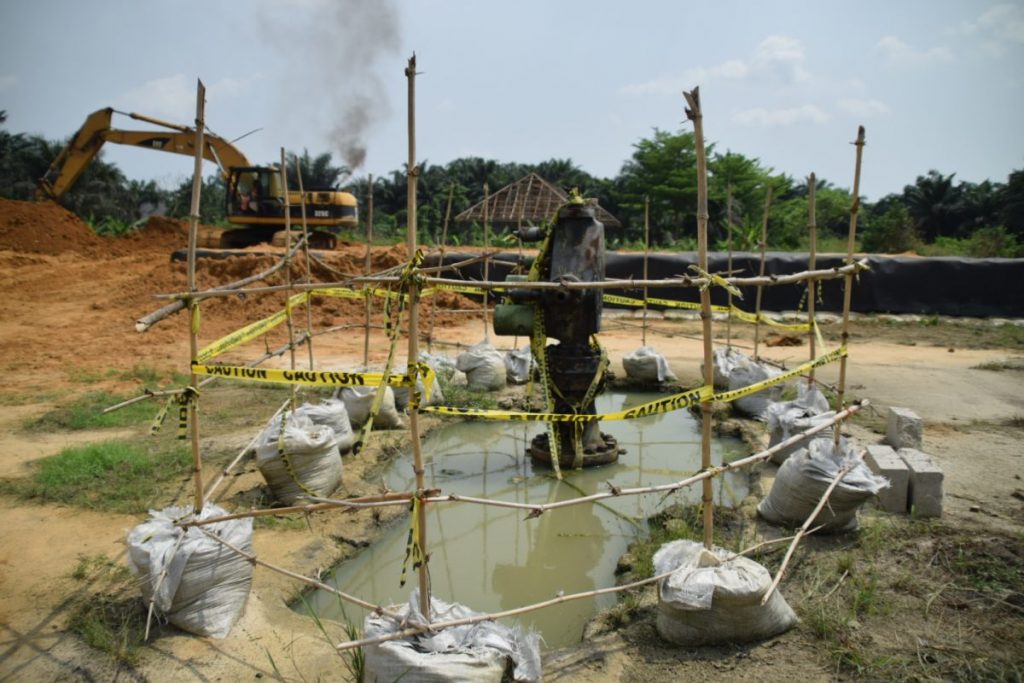*Korean firm angling to corner upcoming contracts *Bonga SW, Zabazaba projects on its radar

Chuks Isiwu & OpeOluwani Akintayo
11 October 2018, Sweetcrude, Lagos — The activities of Samsung Heavy Industries, SHI, in Nigeria are well known for two things: the good and the bad. The good is that it successfully built and delivered the the multi-billion dollar Egina Floating Production and Offloading, FPSO, vessel which is expected to add 180,000 barrels per day of crude oil to Nigeria’s production by the end of this year.
The flip side of the good for Samsung is the graft and manipulation it has allegedly brought to bear in the execution and delivery of the Egina FPSO project.
An independent investigation by SweetcrudeReports in 2013 and last month had uncovered how Samsung Heavy Industries was handed over the Egina FPSO project after heavy bribing of corrupt government officials, who have also promised it other juicy upcoming contracts such as Shell’s Bonga South West and Zabazaba led by Agip.
SweetcrudeReports gathered that Samsung bribed its way to land the Egina FPSO contract award, as another South Korean company which participated in the bids tender processes, Hyundai Heavy Industries, HHI, emerged preferred bidder, and was subsequently recommended by the National Petroleum Investment Management Services, NAPIMS, the investment arm of the Nigerian National Petroleum Corporation, NNPC, making the circumstances in which Samsung was selected appear inexplicable.
Checks revealed that Samsung had entered into a partnership with Integrated Logistics Services, Intels, a Nigerian company with a logistics base in Ikpokiri/Onne, near Port Harcourt, for execution of the Egina FPSO packages and that the Nigerian company had deployed its immense political clout to pressure the NNPC management into breaking its own tendering processes, and rules of engagement.
It was gathered that at a meeting which took place after an NNPC Group Executive Committee, GEC, meeting, held a few days before the 2013 Christmas, Mr. Andy Yakubu, the NNPC group managing director; Abiye Membere, the NNPC group executive director and Mr. Tony Madichie, the NNPC secretary and legal adviser, decided to select Samsung for the FPSO package.
The Group Executive Committee at the time explained that the rationale behind the award to Samsung Heavy Industries was that the company gave a 5 percent discount on the bid advanced by HHI for the Egina FPSO package. Strangely, HHI was neither invited by the GEC nor afforded the same opportunity to match or best the SHI offer lending credence to talk of bribery.
Subverting Nigerian Content scope
The selection of SHI for the Egina FPSO award ran against the grain of due process, the Nigerian Content scope was completely muddled up, putting in jeopardy the possible gains derivable thereof, and the aspirations of the federal government.
Before the Egina FPSO award, Samsung had never executed any project in Nigeria neither did it have any presence in the country.
An NNPC staff who pleaded anonymity had told SweetcrudeReports as far back as 2013, that “Obviously, no aspect of the FPSO package will be executed in Nigeria if Samsung gets the endorsement of the NNPC Board”.
Indications then were that if the NNPC Board endorsed the selection of Samsung for execution of the Egina FPSO packages, the Nigerian Content scope, which would have seen the creation of over 20,000 jobs in the country, would be undermined, which was exactly what eventually happened.
In January this year when SweetcrudeReports visited the Egina FPSO vessel, which had just arrived the Lagos Deep Offshore Logistics Base, LADOL, in Lagos from Korea, for the integration of its topsides, it was noticed that many South Koreans had been brought into the country and hidden inside the vessel by Samsung to handle jobs originally outlined for Nigerians in fulfilment of Nigerian Content aspect of the project.
Findings showed that Nigerians who were working on the vessel were employed on contract.
In fact, on the second visit by our correspondent to the vessel in February/March, this year, a protest by the Nigerian contract workers was on.
A number of the protesting workers told SweetcrudeReports that they were worried about being jobless after the Egina FPSO might have left LADOL for the Egina oil field, the vessel’s eventual operational base.
When our correspondent visited again in August, it was observed that Samsung had shipped in more South Koreans into LADOL for jobs on the Egina FPSO.

While the South Koreans were kept inside air-conditioned offices, even in the FPSO, and had good good, the Nigerian workers were used as labourers to fit-in already-made parts shipped in from South Korea. This is in contrast with the widely held belief that a good portion of fabrication work for the FPSO would be done in-country, thereby providing jobs for Nigerian youths.
During the visit, it was observed that the South Koreans felt uncomfortable with the presence of our correspondent as they did not “want anyone spying on them”.
Already, the South Korean company is targeting other upcoming projects in Nigeria, but oil industry watchers are fearing that given its bribery antecedents, Samsung could still bribe its way into securing such projects. “It (Samsung) wants to collect other deep water projects and plans to use its South Korean workforce to ferry huge funds out of the country”, a source said.
Sources cited, as part of Samsung schemings and manipulations in Nigeria, the current controversy over its demand for an extra $300 million on the Egina FPSO project from Total/NNPC – the owners of the vessel – before its final hand over. Sources have not specified what the extra $300 million being demanded by Samsung is meant for, but it was learnt that Samsung was bent on collecting the money from Total and its Egina project joint venture partners, which include NNPC. “Samsung is sending signals that the vessel would not be released until it gets an extra $300 million. The case is in court and the court will decide whether this happens on not,” a source said.
‘Samsung seeking to entrench corrupt tendency in Nigeria’
A lawyer and Counsel to Lagos Deep Offshore Logistics Base, LADOL, Prof. Fidelis Oditah, accused Samsung Heavy Industries – a subsidiary of the Samsung Group – of trying to entrench its corrupt tendencies in Nigeria.
Professor Oditah stated this in the backdrop of alleged move by the South Korean company to take over land at the Lagos Free Trade Zone belonging to LADOL.
Speaking with journalists in Lagos, Oditah said Samsung was pressing to illegally take over the land and had written to both the Nigerian Maritime Administration and Safety Agency, NIMASA, and the Nigerian Port Authority, NPA, asking to be sold the portion of land inside LADOL, which was leased to it (Samsung) by LADOL for the Egina project.
Describing the action of Samsung as “unruly, against Nigeria’s local content law, and overall, unexpected from a mere contractor/tenant such as Samsung towards its landlord,” he made reference to corruption cases involving the company in other parts of the world, including the bribery case in Brazil, and said the company was trying to bring same to Nigeria.
“Nowhere in the world can a tenant overthrow its landlord. Samsung is a contractor in Nigeria, not an investor, and the land on which it built its facility was leased to it just for the duration of the Egina project, and is open to other contractors with similar projects.
“Samsung wrote to NIMASA and NPA, asking to be given part of LADOL’s land. If Samsung wants to build its own facility, it should first come in as an investor and ask for its own land, not LADOL’s land,” Oditah stated.
In accusing Samsung of bringing its corrupt practice to Nigeria, oil industry observers point to the under-hand dealings it allegedly used in winning the contract for the Egina FPSO project.
Samsung was reportedly the lowest bidder among the contractors who had vied for the Egina FPSO contract. However, according to sources, some “corrupt and unpatriotic Nigerians” had connived to swing the contract for Samsung, shoving aside some of the necessary conditions required of the would-be winner of the contract.
Specifically, the company was said to have been handed over the project after heavy bribing of corrupt government officials and the top echelon of the NNPC.
Industry observers also point to Samsung’s alleged subversion of the Nigerian Content Policy in the execution of the Egina FPSO project. According to them, the integration of the topsides of the Egina FPSO at the LADOL yard in Lagos earlier this year had seen personnel being shipped into the country from South Korea to handle the very integration of the vessel originally planned to be handled by Nigerians at the LADOL yard. The development thus created jobs for the Koreans here in Nigeria to the detriment of the Nigerian labour force, against the provisions of the Nigerian Content Act and the promise by the Nigerian Content Development and Management Board, NCDMB, NNPC, and Total, that the project would create substantial number of jobs for Nigerians.
Earlier this year, LADOL had accused Samsung of “mischief and reckless disregard for all stakeholders” in its dealings in Nigeria in the past 4 years. It said “Samsung has brazenly and persistently flouted Nigerian laws and breached contracts it duly signed with LADOL and its affiliates”, listing these breaches to include refusal to abide by conditions of service for Nigerian staff and abuse of Nigerian workers, violation of procedures of the Nigerian Customs Service and violation of Nigerian Immigration Procedures.
LADOL also accused the South Korean company of breaches of Nigerian Content Development and Monitoring Board regulations, refusal to remit statutory tariffs to the Federal Government despite several demands from the Nigerian Export Processing Zone Authority and sponsoring the publication of malicious and false information about Nigerian government agencies and the business climate in Nigeria, thereby denigrating the Ease of Doing Business regimen in Nigeria.
It also noted “Samsung’s persistent failure to comply with rules and regulations of the Free Zone 8, concealing sums of money provided for in the head contract from LADOL – their local content partner – and demanding huge unconscionable variations from their client (Total/NNPC Joint Venture) and by extension from the Nigerian people”.
LADOL further accused Samsung of “exclusion of their Nigerian content partner from operational activities, and thereby refusing to transfer technology and blatant repudiation of major contractual terms in agreements duly signed with it (LADOL).
The inescapable conclusions, due to the frequency and seriousness of these infractions, according to Ladol, are “that Samsung’s activities threaten the safety and peace of the Free Zone and of other responsible Nigerian and foreign enterprises doing legitimate business within the zone and that Samsung is committed to operating in a manner that brazenly defies our Nigerian regulators, flouts our laws, maltreats Nigerian workers and sabotages the economy of our dear country”.
According to LADOL also, “as a result of Samsung’s recidivist operational practices and breaches, the following have now occurred: (a) Samsung failed to meet the minimum standard required to qualify for an operating license in a Free Zone, their license has therefore expired without renewal, (b) Samsung’s sublease agreement has been duly terminated, and (c) LADOL has filed a court action (Suit No FHC/L/CS/1459/2018) against Samsung related to their fraudulent activities in Nigeria”.
LADOL emphasised that as a Nigerian company, it “is resolute about enforcing its rights and protecting our country from companies and contractors that flagrantly disobey our laws and disrespect their local partners”.
Attempts to get Samsung’s response to the allegations against it was unsuccessful as none of its officers in Nigeria could be directly contacted. An enquiry sent to its website by our correspondent was not replied till our time of going to press.
Organised bribery
In Brazil as in Nigeria, Samsung also has a corruption history. A judge had in 2015 sentenced Nestor Cervero, former international chief of Brazil’s state-run oil firm Petrobras, to over 12 years in prison on charges of corruption and money laundering related to a bribe allegedly paid to the speaker of Brazil’s lower house of Congress.
Cervero and two other defendants were accused of organising bribes from Samsung Heavy Industries in exchange for two drillship contracts, the Petrobras 10000, which was leased jointly by Petrobras and Mitsui in 2006, and the Vitoria 10000, hired by Petrobras in 2007.
Consultant Julio Camargo, who said in a plea bargain testimony that the then speaker of Brazil’s lower house of Congress, Eduardo Cunha, asked him for a $5 million bribe, was given a 14-year sentence that was reduced to reporting to police twice monthly and doing community service because he collaborated.
Lobbyist Fernando Soares, accused of funneling bribes to Cunha’s Brazilian Democratic Movement Party, PMDB, was sentenced to over 16 years in jail.
Cunha, who quitted former Brazilian President, economist and politician Dilma Rousseff’s ruling coalition a few years back, had accused her government of framing him in the broadening scandal focused on Petroleo Brasileiro SA or Petrobras.
He was not a defendant, but the sentences handed down by federal judge, Sergio Moro, gave federal prosecutors in Brasilia more ammunition to bring charges against Cunha and other politicians thought to have benefited from the price-fixing and political kickback scheme.
Cervero’s 12 years and three-month sentence was the second he had received from Moro.
In May 2015, he was sentenced to five years in prison for using a front company to launder money stolen from Petrobras and buy a luxury apartment in Rio de Janeiro. He was fired from Petrobras in 2014 and arrested in January as he stepped off a plane from Europe.
Despite the degree of graft uncovered in the case, executives at Samsung Heavy Industries were not charged, neither were they investigated in the corruption and bribery case. Its officials, therefore, walked away unscathed.
Corruption scandal at Samsung Group
Prior to the Brazil event, a corruption scandal broke out at the Samsung Group in 2007, leading prosecutors to open a formal investigation into charges that its chairman, Lee Kun Hee, masterminded a broad scheme of bribery and illegal transactions.

Prosecutors had investigated three major accusations of criminal behaviour: the creation of a slush fund; the bribery of prosecutors and government officials; and an effort by the chairman, and his aide to illegally help his son take over control of Samsung.
“We are ready to unveil the truth through a stern, fair and thorough probe,” The New York Times had reported, quoting Kim Kyong Soo, a prosecution spokesman, then as saying.
In previous scandals that have plagued Samsung, several executives were convicted of illegally trying to help Mr. Lee’s son, Jae Yong, take control of management, and of bribing politicians. But Mr. Lee’s family had escaped largely unscathed. This had led critics to charge that Samsung runs a vast network of bribery and influence-peddling through the government, the judicial branch and the media, making the Lee family untouchable — a claim vehemently rejected by Samsung.
A whistle-blower: Kim Yong Chul, Samsung’s former chief lawyer, had also confessed to having been personally involved in bribing and fabricating court evidence on behalf of Mr. Lee and Samsung.
*Again, Samsung denied all of Mr. Kim’s allegations Tuesday, saying that he was turning against Samsung out of “personal grudges.”
However, in a legal complaint filed with prosecutors Mr. Kim, who worked as an internal lawyer for Samsung for seven years until 2004, said that Mr. Lee and his top aides illegally ordered transactions that allowed his son to acquire Samsung shares from Samsung affiliates at unfairly low prices.
When prosecutors investigated one transaction in 2003, Mr. Kim said lawyers in his legal division at Samsung trained Samsung executives to serve as scapegoats to protect Mr. Lee, even though those executives were not involved.
Two of the executives were found guilty in a court ruling in October 2005.
In interviews with South Korean media, Mr. Kim said he was “sidelined” by Samsung after he refused to pay 3 billion won, or $3.3 million, in a bribe to the judge presiding over the case.
Mr. Kim’s accusations later took on a new drama when he gave a nationally televised news conference in a Catholic church in Seoul.
“Samsung instructed me to commit crimes,” he said at the news conference. “A basic responsibility for all Samsung executives is to do illegal lobbying, buying people with money.”
Samsung later issued a 25-page rebuttal denying all major accounts of Mr. Kim’s allegations. It noted that Mr. Kim did not provide evidence to support his claims.



